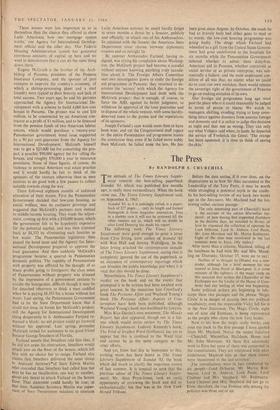The Press
By RANDOLPH S. CHURCHILL
THE attitude of The Times Literary Supple- ment towards the best-selling paperback Scandal '63, which was published five months ago, is really most extraordinary. When the book came out, The Times Literary Supplement said, on September 6, 1963: Scandal '63, as it is enticingly called, is a paper- back of 227 pages ... only its length and format distinguish it from magazine journalism. First in a shabby race it will not be reviewed till the other runners are in, which will no doubt be after Lord Denning has made his report.
The following week The Times Literary Supplement were good enough to print a letter from Clive Irving, joint author of Scandal '63 with Ron Halt and Jeremy Walliegton. In his letter Irving attacked the contemptuous attitude of The Times Literary Supplement, saying that it completely ignored the use of the paperback as an extension of contemporary reportage which can broaden the public knowledge just when it is vital that this should be done.
Nevertheless, The Times Literary Supplement's verdict on the book and on the events that prompted it to be written had been awaited with great interest. In the meantime lain Crawford's book The Prolutno Affair and Wayland Young's book The Prof:tin° Affair: Aspects of Con- servatism have both been published, although Wayland Young's book was mutilated by lawyers.
Miss Rice-Davies's own testament, The Mandy Report, has also appeared, though not in a for- mat which would invite review by The Times Literary Supplement. Ludovic Kennedy's book, The Trial of Stephen Ward (Gollancz), has yet to appear but this is confined to the Ward trial and cannot be in the same categorY as the other efforts.
And yet, from that day in September to this, nothing more has .been beard in The Times Literary Supplement of Scandal '63, the book which did much to clarify the important events of last summer. It is ironical to not that the previous editor of The Times Literary Supple- ment, Mr.. Alan Pryce-Jones, took an early. opportunity of reviewing the book and did so enthusiastically; but that was in the New York Herald Tribune. Before the dust settles, if it ever does, on the disputations as to how Sir Alec succeeded to the Leadership of the Tory Party, it may be worth while strangling a potential myth in the cradle. In his best-selling review of my book two weeks ago in the Spectator, Mr. Macleod had the fol- lowing rather curious passage:
The only interesting part of Churchill's book is the account of the advice Macmillan ten- dered: of how having first supported Hailshain in the decisive days, ha switched to Home; of how he organised the collection of opinions by Lord Dilhorne, Lord St. Aldwyn, Lord Poole, Mr. John Morrison and Mr, Martin Redmayne. Eight of the nine men mentioned in the last sentence went to Eton. (My italics.) After more than a column, Macleod, telling of the luncheon he had with Mr. and Mrs. Maud-
ling on Thursday, October 17, went on to say:
Neither of us thought he (Home] was a con- tender, although for a brief moment his star seemed to have flared at Blackpool. It is some measure of the tightness of the magic circle on this occasion that neither the Chancellor of the Exchequer nor the Leader of the House of Com- mons had any inkling of what was happening. Some political writers are beginning to tele- scope these two passages and the phrase 'Magic
Circle' is in danger of passing into our political vocabulary; even the impeccable Vicky fell for it in the New Statesman. The Magic Circle, eight out of nine old Etonians, is being represented as the people who chose the new Tory leader.
Now to Isee how the magic really works, cast your eye back to the first passage I have quoted
from Mr. Macleod. Notice the names italicised —Churchill, Macmillan, Hailsham, Home and Mr. John Morrison. All these five admittedly
went to Eton but none of them was concerned in the consultations. They are interposed with utter irrelevance. Macleod tells us that these names were 'mentioned in the last sentence,' The consultations were in fact conducted by six people--Lord Dilhorne, Mr. Martin Red- mayne, Lord St. Aldwyn, Lord Poole, Lord Chelmer and Mrs. Shepherd. Mr. Redmayne, Lord Chelmer and Mrs. Shepherd did not go to Eton; therefore, the true Etonian tally among the pollsters was three out of six






































 Previous page
Previous page